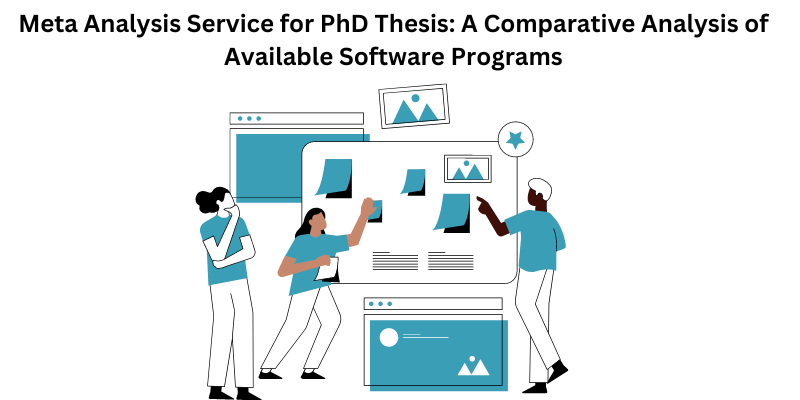
In the case of the meta-analysis service for PhD thesis, this comparative analysis examines the available software programs, their features, usability, and suitability for different research needs. By evaluating the strengths and limitations of these software programs, considering their compatibility with various disciplines and methodologies, and assessing their accessibility to researchers with diverse statistical knowledge, this analysis aims to empower PhD students in making informed choices when selecting a meta-analysis service. By streamlining the meta-analysis process and providing efficient tools, these software programs have the potential to enhance the quality and rigor of PhD theses.
Available Software Programs
i. Review manager (RevMan): It is a software program developed by the Cochrane Collaboration for conducting systematic reviews and meta-analyses. It is a widely used platform, and it is free to download and use.
ii. Comprehensive meta-analysis (CMA): It is a software program that is specifically designed for conducting meta-analyses. However, it is a more powerful and flexible platform than RevMan, but it is also more expensive.
iii. Meta-analysis package (MAP): It is a free and open-source software program for conducting meta-analyses. It is a less powerful platform than RevMan or CMA, but it is a good option for those who are on a budget.
iv. STATA: It is a statistical software program that can be used for conducting meta-analyses. It is a powerful platform, but it is also more difficult to learn than RevMan or CMA.
User-friendly and accessibleness of the platforms
i. Review manager (RevMan): RevMan is designed to be relatively user-friendly, especially for researchers who are familiar with the Cochrane Collaboration’s systematic review methodology.
ii. Comprehensive meta-analysis (CMA): CMA offers a comprehensive set of features and advanced statistical capabilities, but it may require a higher level of statistical knowledge and experience to utilize its full potential.
iii. Meta-analysis package (MAP): MAP, being a free and open-source platform, may have a varying level of user-friendliness depending on the specific software and user-interface design.
iv. STATA: Stata is a statistical software program that requires a certain level of statistical knowledge and familiarity with the software itself.
Strengths and limitations of each platform
1. RevMan
a) Strengths
RevMan provides tools for managing and organizing study data, including study selection, data extraction, and risk of bias assessment.
b) Limitations
RevMan may have limitations in terms of advanced statistical methods and modeling options compared to more specialized software like CMA and Stata.
2. Comprehensive Meta-analysis
a) Strengths
CMA offers comprehensive tools for data extraction, management, and study selection, allowing users to organize and analyze large datasets efficiently.
b) Limitations
CMA is commercial software, which means it requires a purchase, making it less accessible for researchers with limited budgets.
3. Meta-analysis Package (MAP)
a) Strengths
Being open source, MAP platforms offer free access, making them more accessible for researchers with limited budgets.
b) Limitations
Some MAP platforms, especially those built within statistical programming languages like R or Python, may have a steeper learning curve and require programming skills or coding experience.
4. Stata
a) Strengths
Stata is a powerful statistical software with extensive capabilities for data management and statistical analysis, including meta-analysis.
Limitations
Compatibility of the platforms
i. Research domain: Consider the nature of your research domain. Some platforms may be more commonly used and well-suited for specific fields, such as medicine or social sciences. For example, RevMan is widely utilized in the medical field, particularly for Cochrane systemtic reviews. Understanding which platforms are commonly used in your research domain can help ensure compatibility and facilitate collaboration with other researchers.
ii. Methodological requirements: Assess the methodological requirements of your research. Different platforms may offer varying degrees of flexibility and support for specific statistical analysis methods, models, or data types. Consider whether the platform provides the necessary tools and functionalities to address your specific methodological requirements, such as complex meta-regression, multilevel meta-analysis, or handling different types of effect sizes.
iii. Data types: Consider the type of data you will be working with. Some platforms may be more suitable for analyzing individual participant data (IPD), while others are designed for aggregated data. If you require handling and analysing IPD, consider platforms like MixMeta or those that support IPD meta-analysis.
Potential implications of utilizing meta-analysis service
i. Research quality: The quality of a meta-analysis depends on several factors, including the selection and inclusion of studies, data extraction, assessment of bias, and appropriate statistical analysis. The platform itself does not guarantee research quality but can provide tools to support the process. Researchers must ensure they follow best practices and adhere to rigorous methodological standards regardless of the platform they choose.
ii. Validity: The validity of meta-analysis findings relies on the quality and validity of the included studies. Platforms can assist in assessing study quality and risk of bias, but it is the responsibility of the researchers to critically evaluate the studies and their relevance to the research question. Additionally, appropriate statistical methods, such as selecting appropriate effect size measures and conducting appropriate subgroup analyses, should be applied to ensure valid conclusions.
iii. Reproducibility: Reproducibility refers to the ability to replicate research findings using the same methods and data. Transparent reporting and documentation of the meta-analysis process are crucial for reproducibility. Platforms that provide standardized templates, data organization, and result reporting can enhance the reproducibility of the meta-analysis. Researchers should ensure that they provide clear and comprehensive documentation of their procedures, including study selection criteria, data extraction methods, and statistical analysis steps.
Qualitative Meta-Analysis
The Qualitative Meta-Analysis process is a well-established methodology for synthesizing quantitative data from multiple studies to generate robust conclusions to conduct Meta-Analysis Service for PhD thesis. However, in recent years, there has been increasing recognition of the value of qualitative research in providing nuanced insights and understanding complex phenomena. This has led to the emergence of qualitative meta-analysis as a methodological approach that combines and interprets findings from qualitative studies. The qualitative meta-analysis process involves systematic review, data extraction, coding, and synthesis of qualitative data, allowing researchers to identify common themes, patterns, and relationships across studies. By integrating qualitative evidence, qualitative meta-analysis enhances the depth and richness of understanding, complementing quantitative findings with contextual insights. This approach has significant implications for evidence synthesis and evidence-based decision-making in various fields, such as social sciences, education, and healthcare, where a comprehensive understanding of human experiences and perspectives is essential.
In conclusion, the comparative analysis of available software programs for meta-analysis services for PhD thesis highlights the transformative impact of these tools on research quality and efficiency. By automating data extraction and analysis, these software applications streamline the meta-analysis process, reducing errors and saving valuable time for researchers. While Review Manager (RevMan) emerges as a user-friendly and widely utilized platform, Comprehensive Meta-Analysis (CMA) offers advanced statistical capabilities for more specialized analyses. Additionally, the open-source Meta-analysis Package (MAP) provides an accessible option for researchers on a budget. However, the selection of a software program should consider compatibility with the research domain, methodological requirements, and data types. Ultimately, leveraging meta-analysis services through these software programs empowers PhD students to make informed choices, enhance the quality of their theses, and contribute valuable insights to their respective fields of study.
 +91 4422435055
+91 4422435055  getstarted@phdhelpinghand.in
getstarted@phdhelpinghand.in